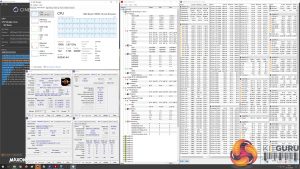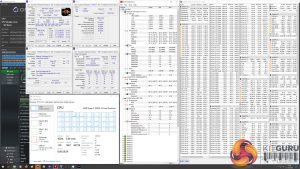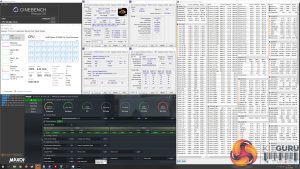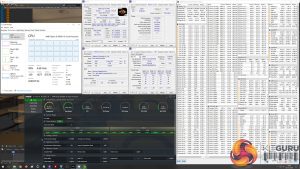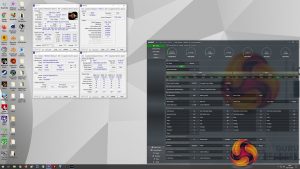Frequency, especially in all-core scenarios, was historically the area where people found issue with Ryzen 3000X/XT and Zen 2. Intel managed to push significantly higher clock speeds from its Skylake-based chips on the heavily refined 14nm process technology. That’s especially true when looking at all-core operating frequencies for Intel versus Zen 2 in power unlimited scenarios.
As such, we were hoping to see the new, optimised Ryzen 5000 chip operate at higher all-core frequencies when running at stock, PBO, and when overclocked.
Stock-Clocked Operating Frequencies:
We see the 5950X hitting around 3.85-4.0GHz all-core frequency in the demanding Cinebench workload. This clock speed value holds up well using air or AIO cooling. This is a very similar clock speed to the 3950X and looks to be held back by one of the default Precision Boost 2 limits.
Interestingly, we see the 5950X operating above its rated maximum boost frequency. In the case of the 5950X, we observed clock values as high as 5050MHz, even if only for small periods of time. The usual maximum boost clock was around 4.95GHz, which is an impressive delivery from AMD.
Ryzen 9 5950X PBO Overclocking:
The 5950X boosts to around 4.45GHz using PBO. The peak is slightly higher, but after a few minutes of all-core loading, 4.45GHz looks to be a good stable point for PBO.
These PBO numbers are very strong, especially for the roughly 0.5GHz increase seen on the 16-core 5950X.
Ryzen 9 5950X Manual Overclocking:
We managed to overclock the Ryzen 9 5950X CPU to 4.7GHz all-core frequency using 1.35V (around 1.32-1.33V delivered). This was tested on both the ASUS and Gigabyte motherboards with AIO and air cooling and worked very well throughout our testing. We didn’t tweak voltages down any further as the temperatures were fine for our testing.
Ryzen 9 5950X Infinity Fabric Overclocking:
We could not get past 1867MHz 1:1 during our quick testing with the 5950X, despite AMD highlighting that 2GHz Fabric Clocks are likely to be achievable with this generation of processors.
AMD highlighted that they are currently seeing some issues hitting 2000MHz Fabric Clocks with the AGESA 1.1.0.0 BIOS revisions, but they are expecting that this can be fixed with a BIOS update. We will have to wait to see if that is indeed the case.
Overclocking Outcome:
4.7GHz all-core from a 16-core processor is highly impressive. It implies that the frequency benefits brought about from the enhanced design in the TSMC 7nm process node of the Ryzen 3000XT CPUs are present for Ryzen 5000.
We were also very fond of the PBO operation as this traded a roughly 250-300MHz lower all-core clock speed for the preferential boost clocks up to around 5GHz. This is the mode that I would personally run for my own usage.
 KitGuru KitGuru.net – Tech News | Hardware News | Hardware Reviews | IOS | Mobile | Gaming | Graphics Cards
KitGuru KitGuru.net – Tech News | Hardware News | Hardware Reviews | IOS | Mobile | Gaming | Graphics Cards


